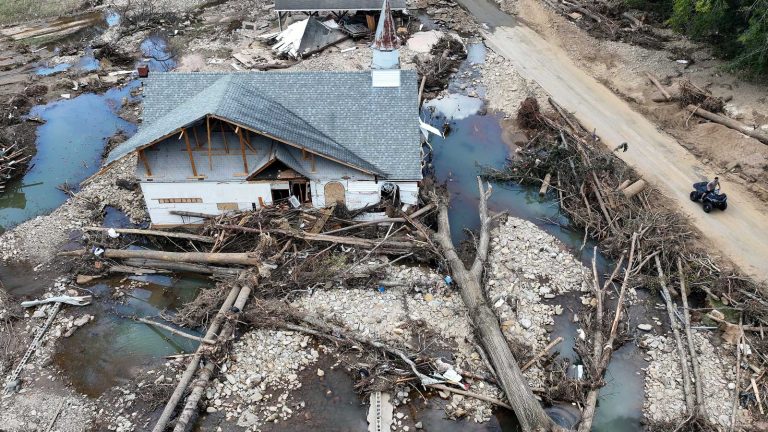A team of 14 climate scientists warned in the State of the Climate Report 2024: A Dangerous Time for the Planet that the Earth's climate in 2024 “will be in a major crisis and will get worse if we continue with business as usual” . The report does not sugarcoat their view of the dangers facing humanity.
“We are on the brink of an irreversible climate catastrophe,” the report begins. “There is no question that this is a global emergency. Much of the fabric of life on Earth is threatened. We are entering a climate crisis. a critical and unpredictable new phase.
The report is the latest such annual peer-reviewed paper published in the journal Biological Sciences by an international team of scientists led by Oregon State ecologist William Ripple.
The authors found that 25 of 35 “signs of life on Earth” reached record levels last year, including global temperatures, human climate pollution, fossil fuel subsidies, heat-related mortality, meat production and forest cover loss.
After decades of warnings from climate scientists and the efforts of some policymakers and activists, “the world has made only very little progress on climate change, in part because of those who stand to gain financially from the current fossil fuel-based system.” strong resistance.” explain. “We are currently heading in the wrong direction, with increasing fossil fuel consumption and greenhouse gas emissions pushing us towards climate catastrophe. We are concerned about the dangers of climate breakdown.
They did note some positive indicators, such as clean energy production.
“Of course, the situation is not hopeless,” Naomi Oreskes, a historian of science at Harvard University and study co-author, wrote via email. “What we want people to understand is that while progress has been made – particularly in terms of the price and deployment of renewable energy – it is not nearly enough. And the atmosphere is not responding to our intentions. It is responding to chemical reactions.
The report calls for a “rapid phase-down” of fossil fuel use by raising carbon prices in rich countries, and using some of the proceeds to fund policies and adaptation programs to stop climate change and reduce the damage caused by climate disasters. It also urges significant reductions in emissions of methane, a potent heat-trapping gas, to “slow the near-term rate of global warming and help avoid tipping points and extreme climate impacts.”
The report warns that without course correction, “climate change could kill millions of people by 2050.”
Signs of planetary life and scientists under pressure
Global average surface air and ocean temperatures broke records in 2023 and are expected to break records again in 2024. and wildfires, hurricanes, and floods.
Some of the other planetary indicators that set records last year include global sea level rise, ocean acidity and heat, the amount of ice in Greenland and Antarctica and glaciers around the world, and the loss of tree cover from wildfires. Preliminary findings from another recent report made headlines when it was found that Earth's trees, plants and soils will sequester almost no carbon in 2023, in part due to that year's record wildfires. But climate scientist Zeke Hausfather points out that this phenomenon sometimes occurs during El Niño years.
While human activities are responsible for long-term global warming, 2023 and 2024 are also affected by El Niño in the Pacific, which draws warm water to the surface, causing short-term surface warming and related climate impacts such as drought and drought in some areas. wildfire.
Still, the report warns that humans are having an increasing impact on Earth's climate. In 2023, global fossil fuel consumption and related climate-warming pollution reached record levels. Global warming of methane pollution.
The report also cites a recent Guardian survey of climate scientists, in which more than three-quarters of 380 respondents believed humanity would fail to meet the targets set in the Paris climate agreement that would see the world Warming is limited to two degrees Celsius above pre-industrial temperatures.


There is some encouraging evidence of such decisive action, although so far not enough. Plans by expert organizations such as the International Energy Agency show that according to current climate policies, global warming will tend to be around 2.5°C by 2100. and solutions over the next few years could further improve this result to below levels that three-quarters of climate scientists fear they expect.
Any directional correction will depend heavily on governments’ climate policy actions in the coming years, and the report includes some good news on that front.
some positive signs
For example, global renewable energy consumption will reach a record level in 2023. Meet the world's growing electricity demand. But the continued growth of fossil fuel burning will eventually come to a halt, as organizations such as the International Energy Agency predict that global coal, oil and gas consumption will all peak within the next five years, and global climate pollution may now also be peaking.
The State of the Climate report also notes that while forest area lost to wildfires has reached record levels, global levels of deforestation caused directly by human activities in areas such as the Brazilian Amazon are declining due to government policies.
In further indicators of the success of climate action, the number of institutional assets divested from fossil fuels and the proportion of climate pollution covered by carbon pricing also reached record levels last year. In other words, fewer organizations are investing in shares of fossil fuel companies, and more and more countries are pricing climate-warming emissions from more and more sectors of their economies.
“Only through decisive action can we protect the natural world, avoid profound human suffering, and ensure that future generations inherit the liveable world they deserve,” the report concludes. “The future of humanity hangs in the balance.”
The current climate situation is dangerous, but humans still have every opportunity to reduce the risk.
We help millions of people understand climate change and what to do about it. Help us reach more people like you.
